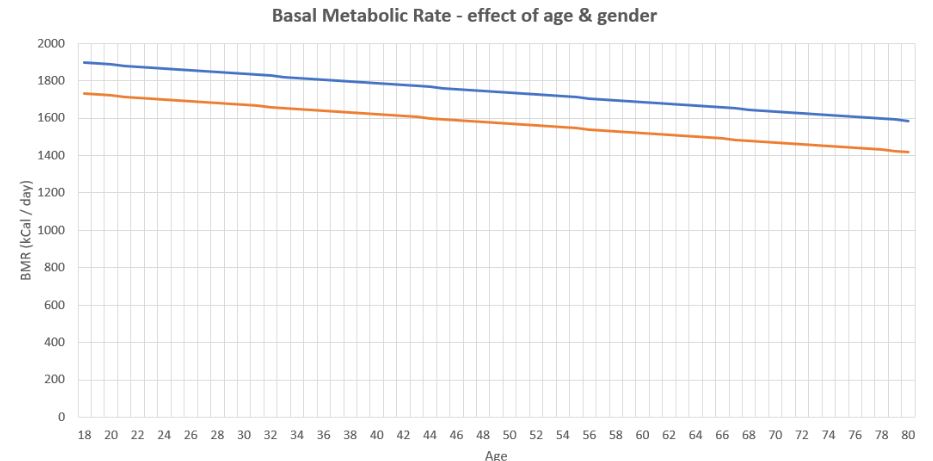Nutrition/BMR Calculator
Body Mass Index (BMI) Calculator, Ideal Body Weight Calculator, Daily Calorie Intake Calculator, Calories Burned Calculator, Calorie Calculator
Basal Metabolic Rate (BMR) Calculator
Use this BMR calculator to easily calculate your Basal Metabolic Rate (BMR) which is how many kCal per day you need if you are just resting. It is useful when calculating calories for weight loss or gain.
BMR stands for Basal Metabolic Rate, although some incorrectly call it "base metabolic rate" or even "basic metabolic rate" - both of them are incorrect. Basal here is used in the sense of "minimal", so if something is basal it is of, relating to, or being essential for maintaining the fundamental vital activities of an organism, for example a basal diet is the absolute minimum nutrients your body needs to survive. Up to 85% of a person's daily energy expenditure goes towards sustaining the basic metabolic functions. BMR is used for calculating energy and nutritional needs for athletes and ordinary people alike, diets, treatment for some health conditions, weight loss diets, etc.
The unit for BMR in scientific / medical literature is usually kilocalories per square meter of body surface area (BSA) per hour: kCal·m-2·h-1. For your convenience our BMR calculator first shows you the BMR in calories per day (kCal / day) so you can read it as the minimum energy your daily diet needs to provide.
A definition found in the medical literature is that the basal metabolic rate is the minimum energy requirement to stay alive and awake. In laboratory conditions BMR is measured by the oxygen uptake under strict conditions, while in most cases it is estimated based on known predictors: age, height, weight, and gender. BMR is on average 5-10% lower for women than men of almost all age groups.
First, no food is to be consumed and there must be no undue muscle exertion in the 12 hours preceding measurement.
Second, the measurement is taken after 30-60 min of resting or laying quietly.
Third, the measurement should take place in a room with controlled temperature at a body neutral level, that is between 22 and 26 degrees Celsius. BMR values are usually only a bit lower than the resting metabolic rate (RMR), which is a similar metric, but with less strict conditions.
BMR formula and calculating your Basal Metabolic Rate
The formula we use in our online tool is: (10 x weight) + (6.25 x height) - (5 x age) + s
where the measurements are in meters and kilograms, age is in years, and s is a gender adjustment. For example, if you are 5 foot 10 inches high 30-year old male, and your weight is 190 pounds, you need to convert your height to 1.778 meters, your weight to 86.18 kg and then plug the numbers in the formula. The adjustment s for males is 5, so the calculations would look like so: 10 x 86.18 + 6.25 x 1.778 + 5 x 30 + 5 = 1,828 kCal per day.
The formula is based on regression analyses performed over the years on varying populations and has good predictive accuracy for everyday use.

The graph above is generated using this basal metabolic rate calculator and clearly shows the difference between the averages for males and females, as well as the decline in BMR with age. Please note that this is not BMR for the average man or woman of those ages, for this, check the graph below.
Basal Metabolic Rate variation over time
The calculation using our BMR calculator is approximately accurate. Your actual rate of energy expenditure for basic metabolic processes will vary over time, depending on your circumstances. For example:
- If you have fever, your BMR will increase
- Physical stress (e.g. recovering from an illness) your BMR will increase
- Mental or emotional stress that leads to depression or lethargy, your BMR will decrease
- Fasting lowers your BMR
- Staying for prolonged periods of the day in a place that is hotter or colder than comfort will raise your BMR
You will note (fourth paragraph of this page) that these are things which are controlled for when measuring basal metabolic rates in medical studies. Make sure to take this into account when planning your diet plan.
Adjusting BMR for percent body fat?
Some sources state that people with higher-than-average muscle mass tend to have higher-than-average BMRs. The idea is that a higher percentage of muscle mass will expend higher amounts of energy even when resting, leading to higher basal caloric needs. Other such as Marra et al. refute this notion, demonstrating in a large-scale study that nor body fat percentage nor lean body mass are good predictors of BMR and that equations constructed specially for overweight and obese persons do not perform better than others. We are not aware of good regression equations that can be applied to adjust for that factor.